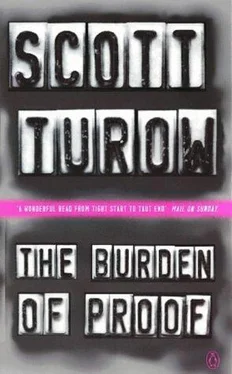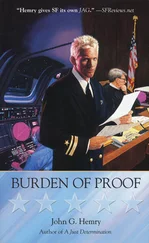Scott Turow - The Burden of Proof
Здесь есть возможность читать онлайн «Scott Turow - The Burden of Proof» весь текст электронной книги совершенно бесплатно (целиком полную версию без сокращений). В некоторых случаях можно слушать аудио, скачать через торрент в формате fb2 и присутствует краткое содержание. Жанр: Детектив, на английском языке. Описание произведения, (предисловие) а так же отзывы посетителей доступны на портале библиотеки ЛибКат.
- Название:The Burden of Proof
- Автор:
- Жанр:
- Год:неизвестен
- ISBN:нет данных
- Рейтинг книги:3 / 5. Голосов: 1
-
Избранное:Добавить в избранное
- Отзывы:
-
Ваша оценка:
- 60
- 1
- 2
- 3
- 4
- 5
The Burden of Proof: краткое содержание, описание и аннотация
Предлагаем к чтению аннотацию, описание, краткое содержание или предисловие (зависит от того, что написал сам автор книги «The Burden of Proof»). Если вы не нашли необходимую информацию о книге — напишите в комментариях, мы постараемся отыскать её.
The Burden of Proof — читать онлайн бесплатно полную книгу (весь текст) целиком
Ниже представлен текст книги, разбитый по страницам. Система сохранения места последней прочитанной страницы, позволяет с удобством читать онлайн бесплатно книгу «The Burden of Proof», без необходимости каждый раз заново искать на чём Вы остановились. Поставьте закладку, и сможете в любой момент перейти на страницу, на которой закончили чтение.
Интервал:
Закладка:
Witnesses and prospective defendants, too poor or too untutored to be accompanied by lawyers,.sat with grand jury subpoenas in their hands, awaiting the Assistants who would make use of them. Now and then federal agents, or an occasional defense lawyer, looking hangdog and disappointed, would emerge from the offices. And of course today Mr.
Alejandro Stern, prominent member of the federal criminal bar, sat here as well, surrounded by two ponderous document cases as he awaited Ms.
Klonsky, who the receptionist said was on the phone.
This office had always struck Stern as a happy place. The lawyers were young and inspired, and almost all of them knew they were merely passing through. They did not remain AUSAs for long-five years, six was the average. Enough time to learn to try a jury case, for each to feel she or he had made a sincere effort to improve community wellbeing, before the greener glades of the private sector, of what Stern still thought of as real practice, beckoned. It was a good job, Stern thought. He had lost the best younger lawyer he'd ever had, Jamie Kemp, to the U.S.
Attorney's Office in Manhattan, where Kemp had gone to try cases on his own and work on a rock musical which resurrected certain songs Kemp had composed two decades before when he had briefly been some kind of musical star.
Kemp was quite nearly not the only one to join federal employment.
Before the present United States Attorney, Stan Sennett, had been returned here from San Diego by the Justice Department, Stern had been approached about taking the job. The top aide of the state's senior senator had invited Stern to breakfast at one of the downtown clubs.
This young man, who looked something like the singing star Garfunkel, with a head of shocked whitish hair that stood erect like a dandelion gone to seed, had thrown around every corny platitude known'to man; it was worse than an obituary. This offer was a compliment to Stern's abilities, the young man insisted, and to the wisdom, Stern knew, of a life in which he had never been politically aligned. While Mayr Bolcarro was not allowed by the senator to reward his retainers with federal appointments, his known enemies were rarely elevated.
For Stern, the prospect of being the federal prosecutor was not easily dismissed. This was an advocate's job of sweeping power. For four years Stern could command the nonuniformed armies of the IRS,, the DEA, the FBI, and deploy them as he saw fit. No more of the drag agents' gruesome shenanigans. An end to the heartless prosecutions of widows and firemen for failing to report the income from part-time jobs or CDs.
But, of course, he would have to be a prosecutor. Stern would have to dedicate himself to apprehension, accusation, punishment, that triad of unmentionables that by long-nurtured reflex he despised.
Could Alejandro Stern rise magisterially in court and excite ajury's ugly passions, could he beg them to inflict suffering they would quail to bear themselves? He could not. No. Could not. The imagery unloosed in Stern a real feeling of illness. Oh, he did not hate prosecutors. He had gotten over that early in his career. He admired at times the incandescent zeal of these young people as they attempted to smite evil for the sake of life on the straight and narrow. But that was not his role, not his calling. He was Sandy Sternwa proud apologist for deviation. No perton Argentine by birth, a Jew alive to hear of the Holocaust could march in the jackboots of authority without intense self-doubt; better to keep his voice among the voices, to speak out daily for these frail liberties, so misunderstood, whose existence, far more than any prosecution, marked us all as decent, civilized, as human.
He could not abandon the credo of a lifetime now.
Ms. Klonsky was off the phone. Beyond the single office door, opened electronically by a solemn guardian behind yellow-tinged bulletproof glass, lay a half block of clatter. Telephones pealed; typewriters, still used in this era of word processing, banged. The Assistant United States Attorneys, distinguished young lawyers with law-review backgrounds, were made into ruffians by the atmosphere and stood in the hallways shouting to one another.
Stern came to this office often, generally with a singular mission: to hinder, to thwart, to delay. On occasions-rare occasions, usually at the very start of an investigation he arrived to offer an openhearted portrayal of what he believed to be the truth. But most often the defense was one of avoidance. It was his goal to learn as much as possible while revealing only what the prosecutor already knew, would never care about, or which might trouble or distract her.
There were those prosecutors who believed in candor, who would lay their case out as a bare challenge. But, for most, the appeal of secretiveness was irresistible. Stern could merely float notions, ask questions, lighting from fact to fact, like some pest nibbling at fruit.
"My best wishes to you," said Stern to Ms. Klonsky, as he entered her small office. Robust-looking and dark, she had come to her feet to greet him. To Stern's surprise, she wore a maternity dress, a blue cotton jumper of plain finish which as yet hung loosely. Observed in an abstracted way, Ms. Klonsky was quite attractive-large eyes, a straight nose, prominent cheekbones, the sort of routine good looks one would expect to see in a restaurant hostess.
She presented a full figure of peasant proportions, strong legs and arms, and an ample bust, although the latter feature, according to nasty bruiting, was somewhat misleading. At Gil's it was said that Ms.
Klonsky had undergone a single mastectomy while she was a law student.
Ergo, the Tiff ess Wonder. Stern had never been convinced of the verity of this information-at Gil's the jokes at the prosecutors' expense seemed to grow crueler as the night wore on-and his doubts rose again now. Would a former cancer patient risk pregnancy, with its hormonal surges and vast bodily changes?
"My daughter is also in this wonderful condition," he said.
"Our first grandchild." Stern heard himself say 'our,' but had no will to correct himself. He would have to search some time to know how else to put it.
Klonsky also appeared to take in this odd note. She congratulated Stern, and inquired about Kate's conditit;n-Stern had noticed long ago that the affinity of women for each other was never greater than in the process of childbearing, this circle no man could enter. But then she added, by the unpredictable logic that always brought people to it, "My condolences on your loss."
He nodded without a word. The two document cases, each the size of an accordion, were beside him. They waited, amenities' exhausted, on the outskirts of adversity. He took a seat before her desk.
"You seem, Ms. Klonsky, to have misconceptions about my client."
She summoned a small, sealed smile, meant to reflect poise and fearlessness. As the years had passed, Stern found himself practicing against young men and women close to his children's ages. In general, it was his impression that they found him charming; his accumulated attainments lent him an almost statesman-like stature. The Assistants were often deferential, without abandoning the poses required by conflict. At moments, Stern would find himself wondering how Peter or Marta would react if they could see the naturalness, the virtual honesty he brought to his relations with persons just like them. What would they think? Would this be the stuff of epiphany, or would they seize on the obvious?
These people were not his children.
"In what way, Mr. Stern?"
"I know you suspect him of a crime. Yes?" She seemed to nod. "Tell me, Ms. Klonsky-"
"You can call me Sonia, Mr. Stern."
Stern took her graciousness as a sign that she believed she could hold her own.
Читать дальшеИнтервал:
Закладка:
Похожие книги на «The Burden of Proof»
Представляем Вашему вниманию похожие книги на «The Burden of Proof» списком для выбора. Мы отобрали схожую по названию и смыслу литературу в надежде предоставить читателям больше вариантов отыскать новые, интересные, ещё непрочитанные произведения.
Обсуждение, отзывы о книге «The Burden of Proof» и просто собственные мнения читателей. Оставьте ваши комментарии, напишите, что Вы думаете о произведении, его смысле или главных героях. Укажите что конкретно понравилось, а что нет, и почему Вы так считаете.












